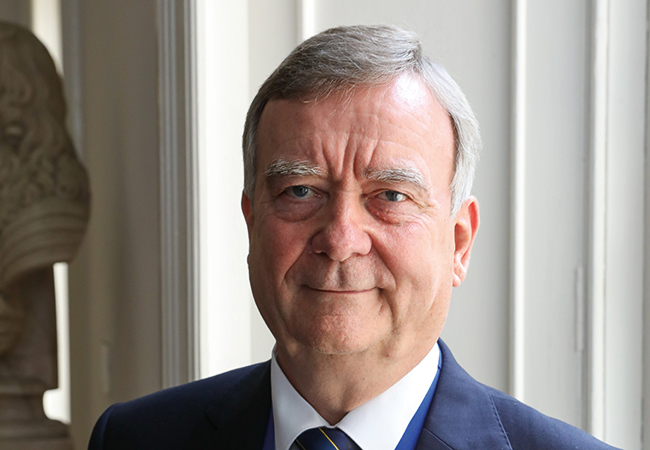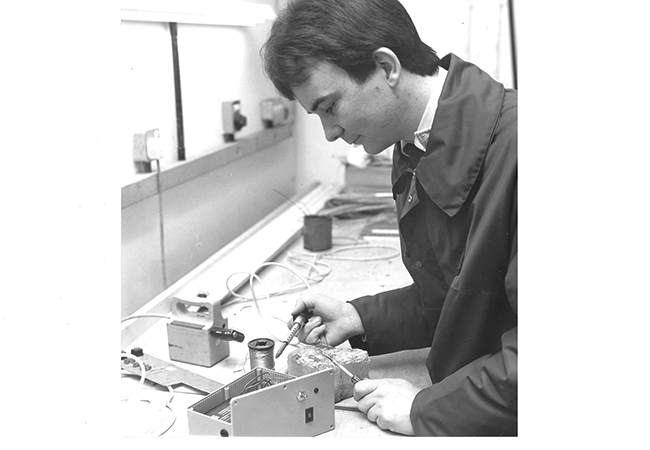
CIBSE President Vince Arnold is urging members to give back to the industry through mentoring and volunteering
The importance of paying it forward was the key message in Vince Arnold’s inaugural address as CIBSE President.
The future of the building services industry depends on those who ‘inspire, mentor and lead’, said Arnold, who urged the audience at the Royal Society in London to step up and pass on their knowledge, just as they were taught and inspired by the previous generation.
He added that a life dedicated to mentoring and volunteering had equipped him with the skills and leadership needed to build a successful career as a building services engineer. This began at the Post Office (PO), and has given him the satisfaction of seeing young engineers flourish under his guidance and tutelage.
Arnold’s experience enabled him to make key contributions to building safety improvements after the Grenfell Tower disaster. He has also been instrumental in helping to raise competence in the industry, having sat on the Built Environment Competence Strategy Group and a number of other working groups and committees.
He has been a big supporter of CIBSE for the majority of his career and is a current Board Member. He has also been chair of the judges for the Apprentice of the Year for the past four years and a CIBSE Professional Review interviewer, at all levels, for more than 25 years.
The currency of volunteering
At his inauguration, Arnold called volunteering a special type of currency. ‘It’s that warm feeling you get from seeing those you are mentoring do well,’ he said. ‘Unlike a financial reward, this currency never diminishes; it grows, creating a ripple effect that strengthens our profession and ensures its future.’ The time, energy and experience you give today ‘will echo for generations to come’, he added.
As a 10-year-old, Arnold joined the St John Ambulance Brigade as a volunteer and has been paying it forward ever since. Driven by a passion for aviation, he volunteered for the Air Training Corps at 13, and gained valuable experience in leadership and personal development. At 22, he was commissioned as an officer in the RAF Volunteer Reserve and served for 13 years, all the while embarking on a successful career in building services engineering.
He started work as an electrical technician apprentice at the PO, which built and maintained its own buildings, so there were opportunities for Arnold to develop his electrical knowledge and put his leadership skills – learnt from volunteering – to good use.
It was while working as an electrician in Milton Keynes that he got his first taste of building services design. The electrician in charge of the project asked Arnold to attend project meetings, where he discussed electrical progress with the architect and design engineer. ‘I was answering questions about electrical work and I really enjoyed the responsibility,’ he says. ‘I thought, wow, this is something I want to do.’

Arnold, pictured during his time as an electrical technician apprentice with the Post Office
Arnold calls it his Jungle Book moment, because he told the building services engineer: ‘I want to be like you.’ In reply, the engineer told him to ‘get a degree and get chartered’, so Arnold embarked on a part-time, seven-year degree with the Open University, sponsored by the PO and managed by the Institution of Electrical Engineers. ‘A phrase I hear a lot today is “earn while I learn”, and it’s how I did it,’ he says.
Before attending an interview to become chartered, Arnold had to prove he had the same understanding as a recent full-time graduate by completing a technical review. This experience encouraged him to become a reviewer and he has been interviewing for CIBSE for more than 25 years now, including candidates on the technical report route.
‘The interviewing experience is humbling, having struggled myself on the other side of the table,’ he says. ‘I enjoy it and find it rewarding.’
Arnold also lectured at the PO’s training school, which he fitted out and managed. ‘I enjoyed demonstrating skills such as arc welding to managers. It gave them an appreciation of how tough it was,’ he says.
He was put on a management pathway and, after five years, was given an executive role, in which he managed UK engineering policy, guidance and standards on PO projects.
He was eventually headhunted by Royal Mail Engineering and Construction, part of the PO,and was soon heading up a regional office in Brighton. Here, he was involved in a wide variety of projects, from sub-post offices to complex sorting offices and mail centres.
In 1999, Arnold’s consultancy was divested by Royal Mail and became the National Design Consultancy (NDC 2000). It had five years of guaranteed work from the PO and Royal Mail, but then had to compete for work.
Managing change
‘It meant that staff had to be competitive. We had to manage the culture change,’ says Arnold, who was a company director and helped NDC 2000 move into other sectors, such as defence, government, retail and offices. ‘The secret of managing starts with respecting the staff. It’s so important that they feel they have you on their side. Managers have the right to manage, but staff have the right to be managed fairly.’
Mentoring, he adds, helps staff meet future challenges. ‘They need to be mentored face to face; it’s important that they collaborate with knowledgeable people.’
Collaboration, too – especially in the early stages of a project – is very important, says Arnold.
Collaborating for safety
Collaborating to improve building safety was a key theme of Arnold’s presidential address . ‘The Grenfell Tower Public Inquiry highlighted how vital collaboration is,’ he said.
Building managers must work closely with designers, contractors and other stakeholders, he told the audience, to ensure that their actions are aligned, transparent and accountable. ‘This is no longer optional – effective collaboration is now a legal and ethical obligation,’ he added.
The industry has to make sure people are competent and trained, says Arnold. ‘We’ve done a lot of work in our industry, but we’re not there yet. Look at how many buildings are being stopped by the Building Safety Regulator at Gateway 2 because they don’t meet the requirements of the Building Safety Act. We have to learn from these experiences.’ See here for a case study on design failure.
While he acknowledges that allowing time for staff to volunteer is difficult, he believes the soft skills they acquire are of huge benefit to employers. ‘They are improving their staff through volunteering. It develops people in ways they don’t expect, because volunteering is not something you do every day in the office.’
Arnold had two opportunities to volunteer overseas. In Romania, in 1997, he helped refurbish the building services of a small hospital (sponsored by the Royal Mail) and was then asked to manage the construction of a school at an orphanage in Zambia in 2006. At his presidential address, he urged audience members to give back whenever they can and to never stop learning, reminding them that ‘curiosity and adaptability drive success’.
Arnold says being CIBSE President is a red ribbon on his career, but he’s not planning to stop once his term is over. ‘I enjoy what I do, especially developing people, and helping them grow their knowledge and experience,’ he says.
